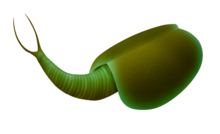Protocaris marshi is an extinct species of bivalved arthropod known from a single specimen collected from the Cambrian Series 2 aged Parker Formation from the Parker Quarry of northwestern Vermont, United States[2][3] The specimen is preserved in top-down view and has a bivalved carapace, a segmented trunk and a forked tail. Its precise taxonomic position is uncertain, due to the limited nature of known remains, but it is suggested to be a member of Hymenocarina belonging to the family Protocarididae, which also includes Tokummia and Branchiocaris.[4]
| Protocaris Temporal range:
| |
|---|---|

| |
| P. marshi | |

| |
| Holotype specimen | |
| Scientific classification | |
| Kingdom: | |
| Phylum: | |
| Class: | |
| Order: | |
| Family: | Protocarididae
|
| Genus: | Protocaris |
| Species: | Protocaris marshi
|
References
edit- ^ Charles Doolittle Walcott (1884). "On a new genus and species of Phyllopoda from the Middle Cambrian". On the Cambrian faunas of North America. Preliminary studies. Bulletin of the United States Geological Survey. Vol. 10. USGS. pp. 50–51.
- ^ Charles Doolittle Walcott (1886). "Introductory observations". Second contribution to the studies on the Cambrian faunas of North America. Bulletin of the United States Geological Survey. Vol. 30. USGS. pp. 11–71.
- ^ Pari, Giovanni; Briggs, Derek E.G.; Gaines, Robert R. (2022-02-16). "The soft-bodied biota of the Cambrian Series 2 Parker Quarry Lagerstätte of northwestern Vermont, USA". Journal of Paleontology. 96 (4): 770–790. doi:10.1017/jpa.2021.125. ISSN 0022-3360.
- ^ Aria, Cédric; Caron, Jean-Bernard (2017-04-26). "Burgess Shale fossils illustrate the origin of the mandibulate body plan". Nature. 545 (7652): 89–92. doi:10.1038/nature22080. ISSN 0028-0836.